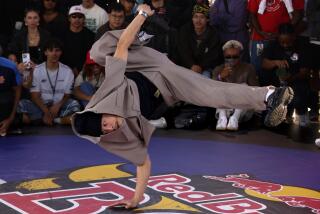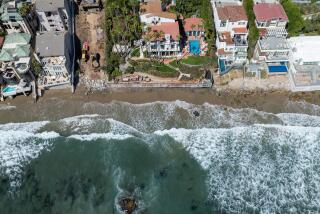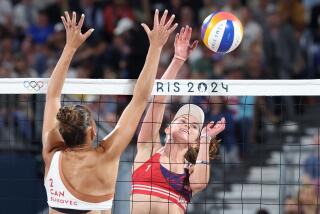They Were Simply Brazilliant
- Share via
They dumped volleyball players from two rival tours, along with 2,700 tons of Simi Valley sand, on the tennis courts at UCLA and then sat back to see how this curious experiment they called the first World Championships of Beach Volleyball would play out.
Among the initial findings:
1. Southern Californians, thrill-seekers in many respects, are veritable sticks in the sand when it comes to their beach volleyball--meaning they prefer it on the beach--which resulted in more than 1,000 empty seats at Saturday’s final day of competition.
2. Southern California may be the birthplace of beach volleyball, but the new capital is Rio de Janeiro. Or Sao Paolo. Brazil swept both the men’s and women’s finals Saturday, beating favored American teams in their own backyard.
In the men’s division, the ninth-seeded tandem of Guilherme and Para overcame a sleepwalking start and rallied to defeat the third-seeded U.S. team of Canyon Ceman and Mike Whitmarsh, 5-12, 12-8, 12-10, for the gold medal.
In the women’s division, the third-seeded duo of Sandra Pires and Jackie Silva knocked off the top-seeded pair of Lisa Arce and Holly McPeak, 12-11, 1-12, 12-10.
3. The feuding beach volleyball factions, the Association of Volleyball Professionals and the Federation Internationale de Volleyball, showed they could co-exist for four days in a balmy, pristine setting--barely--and just to hammer it home, Guilherme and Para tastefully refrained from whooping “FIVB RULES!” after upsetting AVP reps Ceman and Whitmarsh for the championship.
In fact, Guilherme pleaded for a cease-fire when asked if he regarded his gold medal a triumph for the FIVB over the AVP.
“I don’t think that way,” Guilherme said. “I dedicate this victory to me and my partner, and to hard work, and not the FIVB proving anything. . . .
“We don’t want this fight between the AVP and the FIVB. We have to work together. We played here at the beginning of the year in a couple AVP tournaments and they welcomed us so well. I like the people on both tours.
“It’s not the AVP or the FIVB--it’s the players and beach volleyball who are winners today.”
Beach volleyball on tennis courts at UCLA, however, was a mixed proposition, at best.
Promoter Leonard Armato hailed his artificial beach in Westwood, claiming it succeeded in “changing perceptions,” about the sport of beach volleyball in Southern California.
But FIVB President Ruben Acosta expressed disappointment over the small crowds at UCLA and said that if the world championships ever return to the Los Angeles area, “I would go to Manhattan Beach.”
Attendance became such a sensitive issue among tournament organizers that no official gate totals were released for any of the four dates of competition. (Admission to Wednesday’s qualifying matches was free.)
After Saturday’s last match, Armato and officials from co-sponsors Nike and Ericsson Mobile Phones were ushered into the media workroom to address the attendance question. No one gave any exact figures on Saturday’s crowd--”I would think 4,000,” Armato said--but press-row estimates placed attendance inside the 5,200-seat Center Court closer to 3,000.
Acosta said he was “very concerned” about the size of the crowd and promised to “do my best to see that these seats will not be empty at the next World Championships.”
Those are scheduled for 1999, possibly in South Africa, possibly in Berlin, but probably not back in Westwood.
Asked if attendance might have been better had the World Championship of Beach Volleyball been played on an actual beach, Acosta said, “I strongly believe so. I am strongly convinced.”
Acosta called the Westwood Bay concept “an experiment, a very interesting experiment. The results could have been better, but we can live with it and learn from what we saw here.”
As for the state of American beach volleyball, well, two years’ time can heal a lot of wounds.
The Brazilian sweep particularly stung in that the winning men’s team of Guilherme-Para was only the third-ranked tandem from Brazil. The country’s top two men’s teams, Jose Loiola-Anjinho and Paulo Emilio-Paulao, were eliminated by Guilherme-Para in the quarterfinals and semifinals.
Silva and Pires won the gold medal at last year’s Olympics as Brazilian women claimed both the gold and silver medals. They were underdogs against Arce-McPeak, the current top-ranked team in the world, but that, Silva surmised, worked in the favor of the Brazilians.
Along with their victories, both Brazilian teams received $60,000 in prize money--$30,000 a player. Each second-place U.S. team shared $42,000.
“I think Americans and Brazilians are the best volleyball players in the world,” Silva said. “But today, Brazilians are the best.”
More to Read
Go beyond the scoreboard
Get the latest on L.A.'s teams in the daily Sports Report newsletter.
You may occasionally receive promotional content from the Los Angeles Times.






